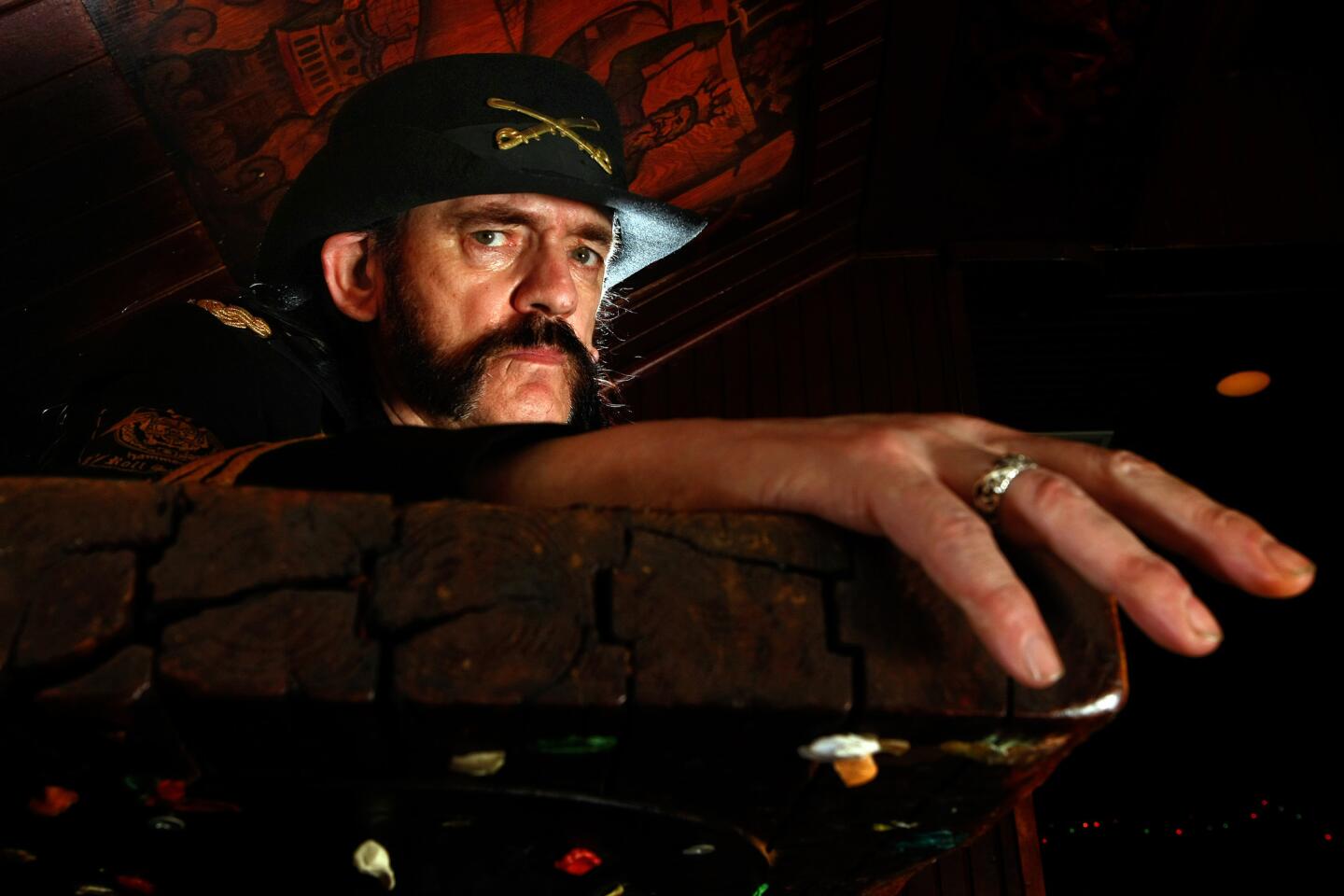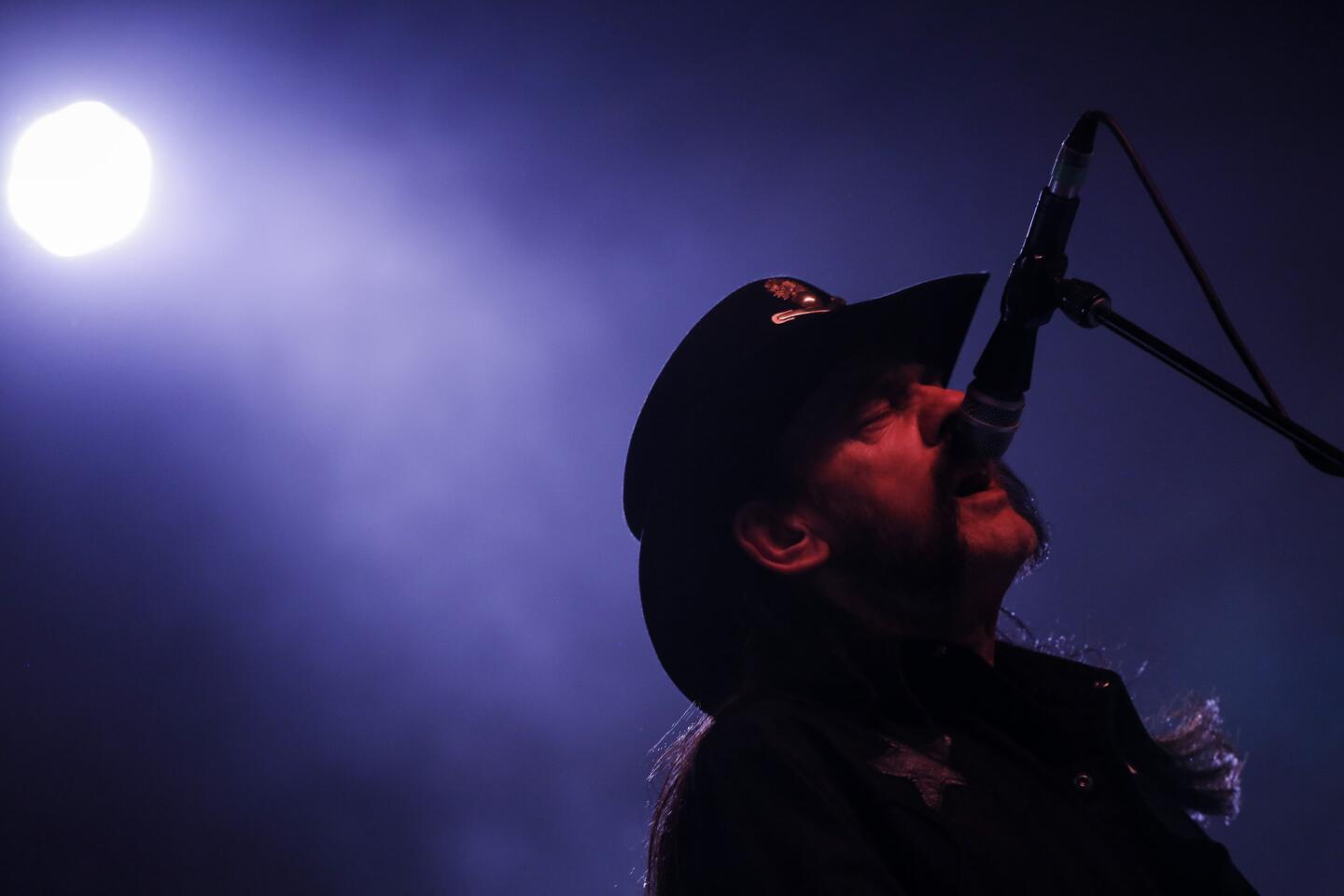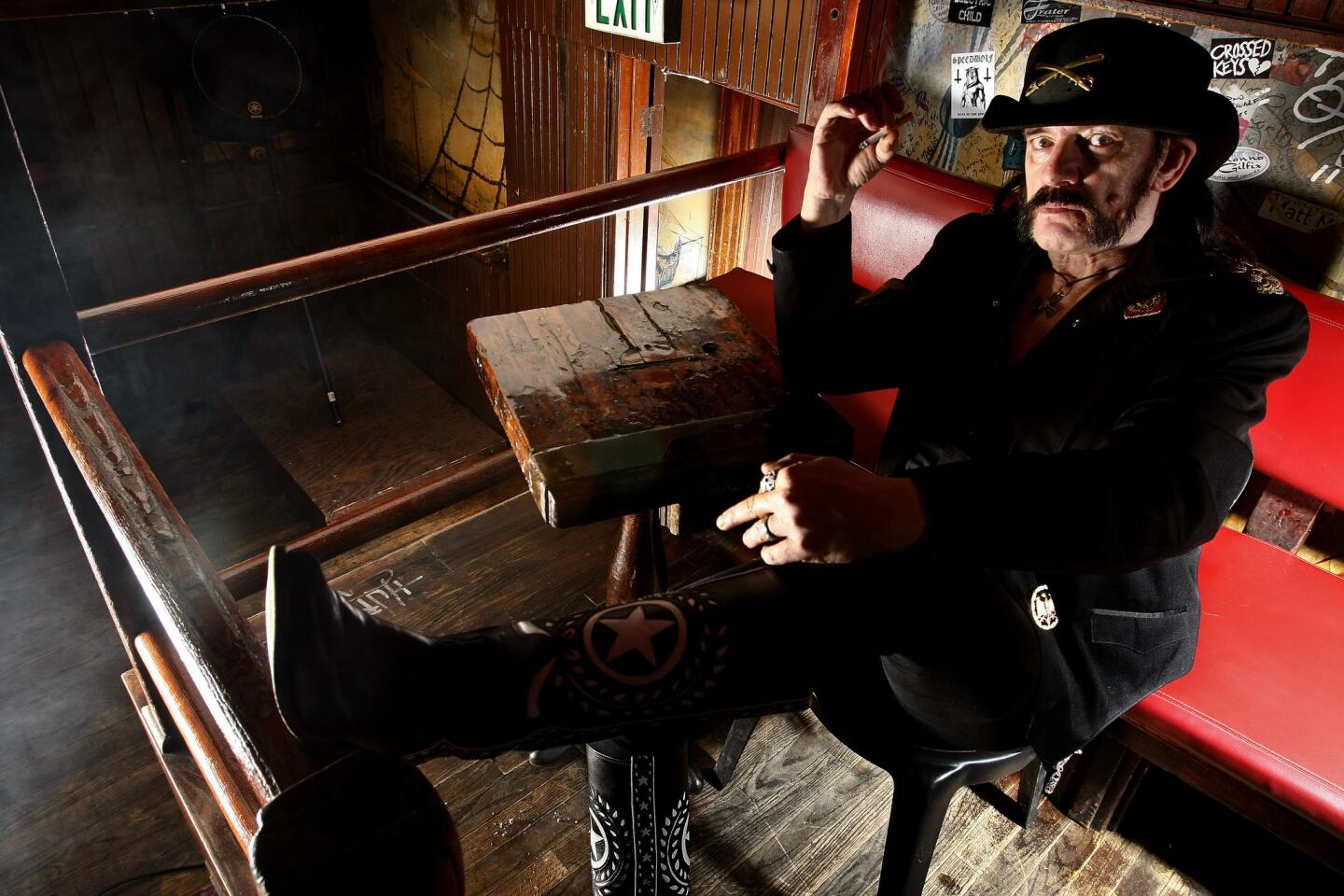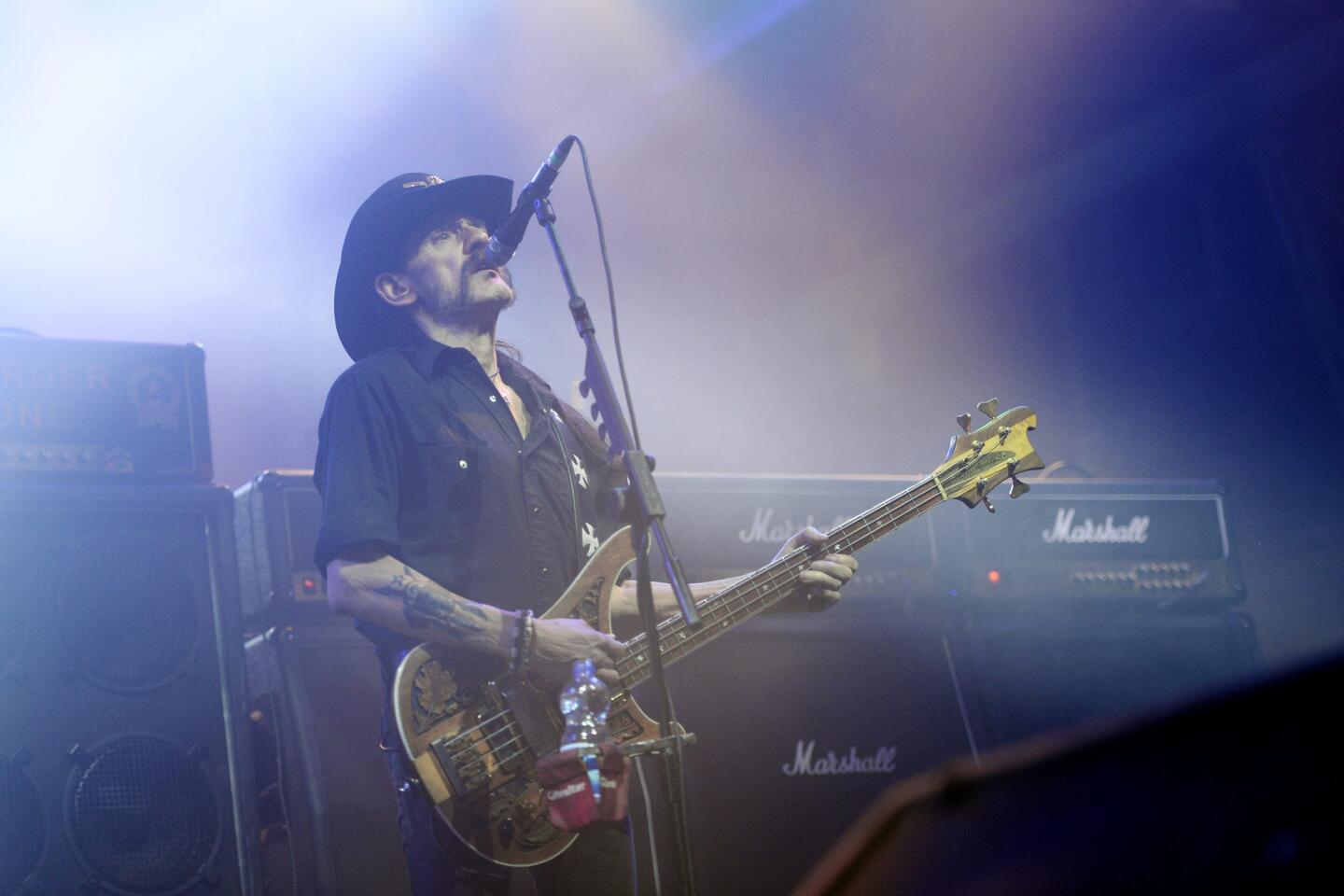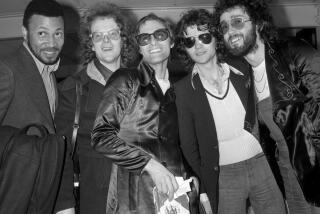From the Archives: Lemmy: Rock ‘n’ roll’s ace of spades
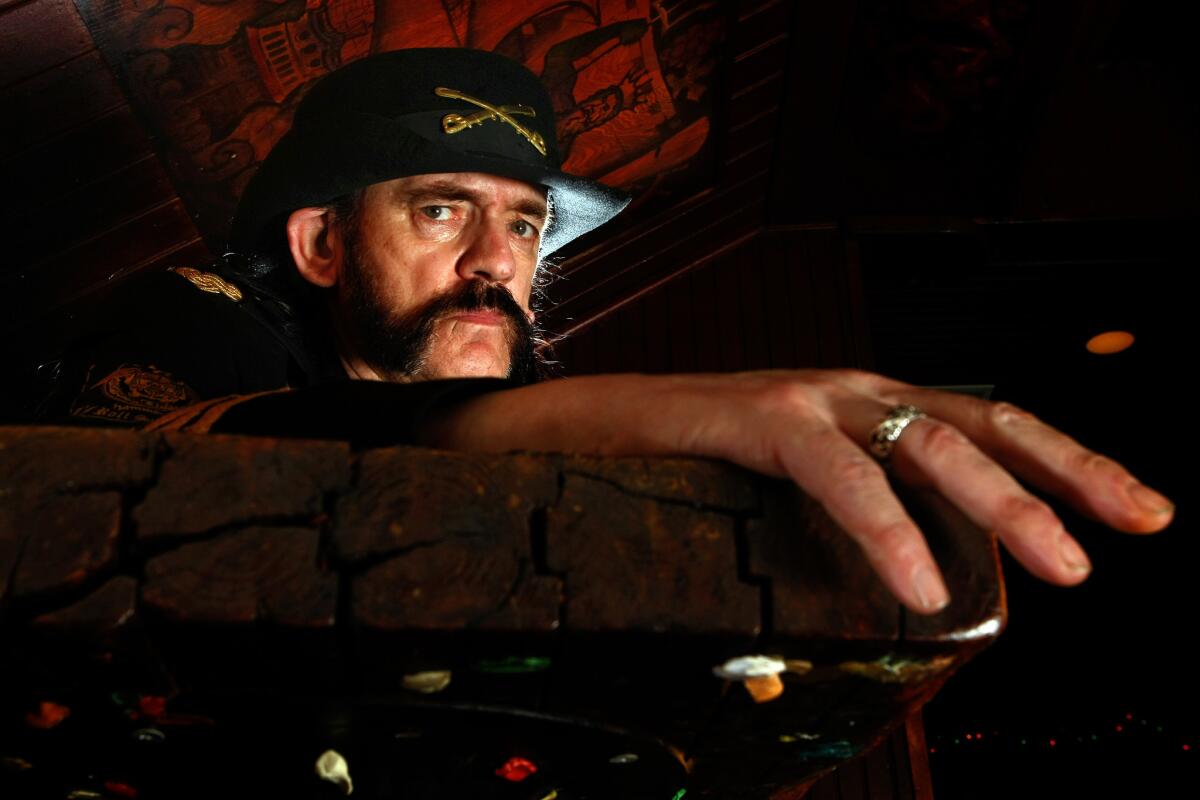
Lemmy in West Hollywood in 2011.
Editor’s note: Lemmy Kilmister has died at age 70. This article from the archive was published Jan. 21, 2011.
***
The pirate at the end of the bar is absorbed in a game of chance, tapping at a video-game console through virtual dice, cards, puzzles and music trivia between sips of bourbon and Coke. Lemmy Kilmister, the iconic frontman for the hard-rock band Motorhead, feeds more money into the machine. “You win some, you lose some, it’s all the same to me,” he says with a grin, quoting his own song “Ace of Spades.”
This is a favorite pastime for the man in black, spending another afternoon and evening at the Rainbow Bar & Grill, his neighborhood pub on the Sunset Strip. He’s a recognizable figure here in his muttonchops and horseshoe mustache, the prominent warts on his left cheek, the vintage Iron Cross around his neck. He stands tall in custom-made cowboy boots embroidered in elegant white stars and wears golden epaulets on his shoulders.
At 65, he is a hero to rockers worldwide, a growling singer and bassist at ease at the nexus of heavy metal and punk, wailing about drink and fornication. It’s a life examined with great care and excessive volume in a new documentary, “Lemmy” (which has a subtitle not suitable for a family paper), opening Friday.
Kilmister can often be found at the Rainbow between Motorhead tours, which keep him happily on the road more than half the year, and fans will sometimes wander in to catch a glimpse of the imposing British rocker. “Funny that, innit? I can’t understand it,” he says. “If you’re going to see anybody in L.A., it should be the girls.”
On the TV above him is a live, high-speed police chase, and just the night before, this section of the Strip had been shut down early by sheriffs deputies after a riot erupted outside a punk rock show at the Key Club. But this is a normal night out for Kilmister, just two blocks away from his apartment, which is crowded with books and music, World War II artifacts and personal memorabilia from his long career.
“Where I live is on the road, on the bus,” Kilmister observes. “It’s fun. Every day is new. I can’t imagine being home all the time. It must be terrible.”
Born Ian Kilmister on Christmas Eve in 1945, he is a rock ‘n’ roll lifer, but he remembers a time before rock, before Elvis and Little Richard forever changed his world.
He grew up in the West Midlands and in North Wales and first picked up a guitar at 16. He was also around to see the early Beatles perform at the Cavern Club in Liverpool, was later a roadie (and, according to the movie, LSD connection) for Jimi Hendrix, and spent four years in the early 1970s in the space-rock band Hawkwind.
When he was forced out in 1975, Motorhead was born, erupting with a raw, driving force and a sound rooted in straight-ahead rock ‘n’ roll and molten blues.
From the beginning, Motorhead played fast and loud, drawing inspiration from the MC5 and Deep Purple, while setting a pace for the coming generation of thrash metal bands: Metallica, Anthrax, Slayer, etc. The newest Motorhead album, “The World Is Yours,” is set for release Feb. 8 and delivers on the same driving, back-to-basics grind.
Motorhead, with guitarist Phil Campbell and drummer Mikkey Dee, is set to perform at the House of Blues in Anaheim on Jan. 25 and return to Los Angeles on March 11 at Club Nokia.
“The music is damaging. It bruises you,” says Henry Rollins, the former Black Flag shouter and spoken-word artist.
“He still has this force in the universe, and that is not mellow music. He is not going gently into the good night.”
Kilmister has managed to survive decades of hard living, the booze and recreational drugs, including a taste for speed, but never heroin.
“It was dumb luck. We all could have gone anytime. Especially in the ‘60s, when it was, ‘If it fits in my hand and my mouth, I’ll take it,’ ” he says.
He’s still able to rage easily through 90 minutes of hard rock onstage night after night, but diabetes means his legs aren’t always up to the two-block stroll from his apartment to the Rainbow and back. He was treated for a heart murmur in 2003 and now takes blood pressure medication, but retirement is no option. And the age limit to rock edges ever higher.
Guitarist Scott Ian of Anthrax calls Kilmister “a true pirate” in the tradition of Rolling Stones guitarist Keith Richards and gonzo journalist Hunter S. Thompson, “People who live life exactly on their own terms.”
The details of that life are explored in “Lemmy,” a film already acclaimed from its first screenings last year at the South by Southwest festival in Austin, Texas. The documentary was a four-year, self-financed project for director-producers Greg Olliver and Wes Orshoski, who trailed the outlaw rocker onstage and off.
Kilmister is seen at the Rainbow, driving a borrowed German tank in Corona, telling stories backstage in Europe and the U.S., and on the bus with a book on the Nazi regime -- he’s a history buff. And there are endless testimonials from the likes of Metallica and Alice Cooper, and from occasional collaborators Ozzy Osbourne and Dave Grohl.
“He’s a very solitary man,” says Orshoski, a fulltime music journalist before making “Lemmy.”
“I think he’s content with the choices he’s made in his life, and he doesn’t regret them.”
Fans travel the world to see him and Motorhead. Rockers from Germany spend their vacations following the band on tours of Brazil. British fans come to shows in the U.S., and followers from Japan seek him out at the Rainbow.
“Dedication like that is worth its weight in gold,” says Kilmister, who does what he can to treat them right on tour, with backstage passes or even a spare room to crash in overnight.
From a nearby table at the Rainbow, a young man in a black Motorhead T-shirt wanders nervously up to Kilmister, who is still feeding dollar bills into the video-game machine.
“I just wanted to meet you,” says Andrew Ledwedge, 23, eyes widening. “I saw you in Columbus, Ohio, and it’s the closest I’ve ever had to a religious experience.”
Kilmister shakes his hand warmly and poses for a cellphone picture.
Soon, someone at the bar cranks up the stereo for an old Motorhead tune, “See Me Burning,” and Kilmister sings along to the inspirational lyric: “Come on over later, bring your sister / I swear to you she won’t be in the way!”
Another Motorhead song follows, then another. Kilmister stands at the bar, singing along and riffing on air guitar.
“Guess who this is,” he jokes, sounding pleased, and he nods quickly to the machine-gun beats, looking like the dedicated rock ‘n’ roll fan he’s always been.
More to Read
The biggest entertainment stories
Get our big stories about Hollywood, film, television, music, arts, culture and more right in your inbox as soon as they publish.
You may occasionally receive promotional content from the Los Angeles Times.
